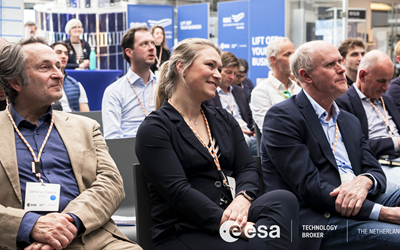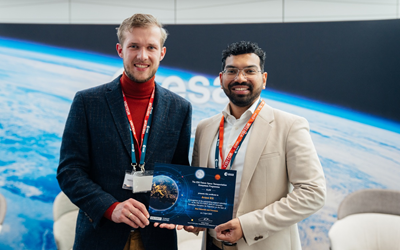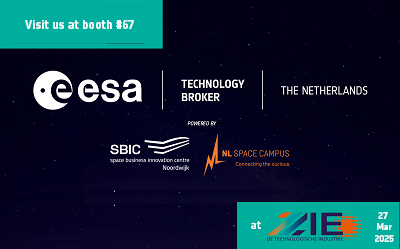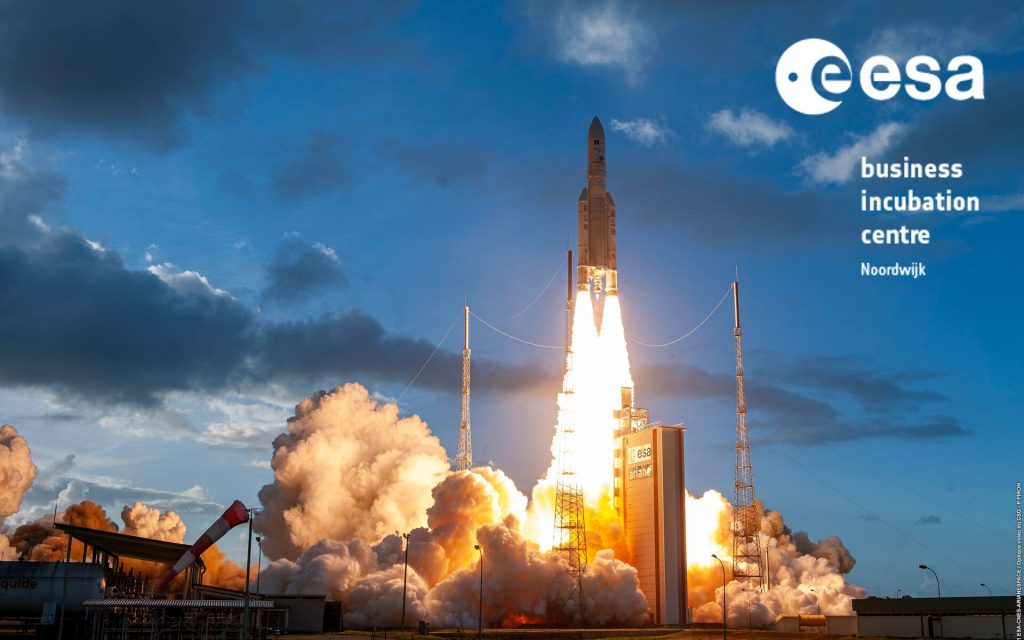
The attention for the space industry is skyrocketing, and there are no signs of slowing down. Last year we’ve welcomed 7 new businesses to our incubation programme for space related startups. And a new selection round has been opened already. From a business perspective, now is the time to become a space entrepreneur.
As the manager of the ESA BIC Noordwijk programme, we have defined two major reasons for why it makes sense to now start a space related business: space commercialisation and the need for impact on earth. This article features the first one. Note: we will talk about these topics from an European point of view.
Ride the wave of space commercialisation
First, what is space commercialisation? There are several ways of looking at this definition. One way to look at it, how the Harvard Business Review states it, is as seizing opportunities in a growing space-for-space market, rather then a space-for-earth market. You could also compare parts of these markets to the terms upstream (space-for-space) and downstream (space-for-earth), as the European Space Agency (ESA) likes to define them.
These opportunities in the space-for-space market, for instance, are:
- Space flights for citizens: we all have seen civilian flights done by Virgin Galactic, Blue Origin and SpaceX – and they won’t be the last companies to do so.
- Private companies taking over the role of governments: by putting people and research into space. The government-led space agencies now become customers instead. The best known example of this shift is SpaceX bringing astronauts from several agencies like NASA, ESA and JAXA to the International Space Station. All these commercial space efforts done by private firms are often called ‘NewSpace‘.
- Commercial launches: rockets that carry payloads like private companies’ satellites.
In 2020, there have been more commercial launches then ever, research by BryceTech shows (see Image 1). Also, the cost of launching a rocket is going down every year, drastically.
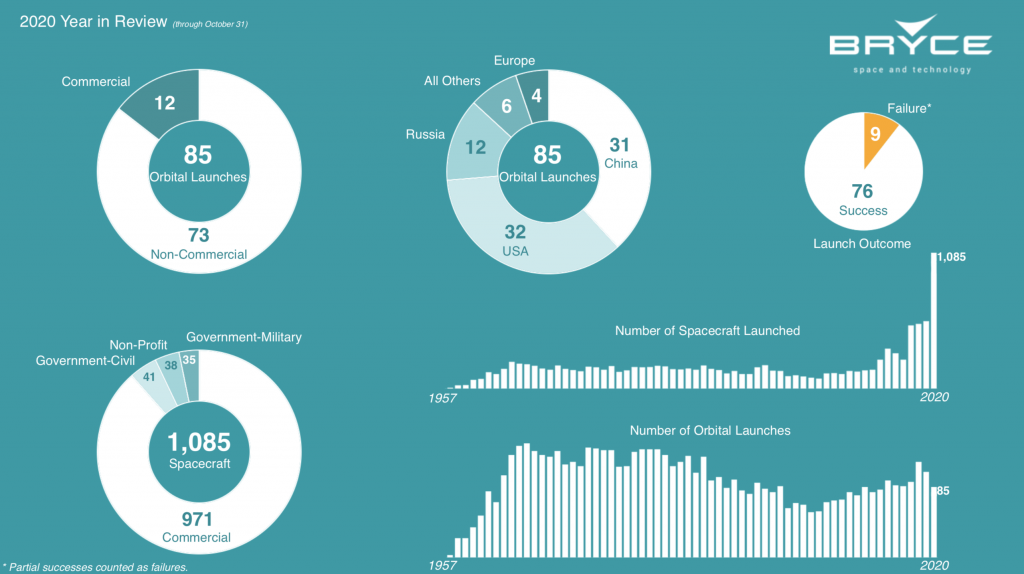
Access to the European space industry
Commercialisation of the space industry also means access. With this we mean access into the space industry itself and access to sufficient funds. There’s evidence all around us.
For instance, think of transparency. There are plans to make the ESA’s R&D facility ESTEC in Noordwijk more open, both literally and figuratively. Giving the general audience a view of what’s done behind fences, and mingling with external expertise is a great premise for entrepreneurial energy to occur.
Next, the 22 (and counting) business incubation centres of ESA (ESA BICs) are cooperations between the European Space Agency, national space agencies and commercial parties. Here startups work with space technologies and/or data. For instance, ESA BIC Noordwijk is managed by, you guessed it, Space Business Innovation Centre Noordwijk. This structure makes it relatively easy for entrepreneurs to get in touch with a major space agencies and its industry on a commercial level.
Access to funding
Current funding climate in Europe still is suboptimal, as a report by the European Investment Bank (EIB) shows. And that’s due to the lack of venture capital for NewSpace (upstream) businesses. One could also argue that compared to the US, Europe’s presence in space itself is limited. Therefore it does not have enough novel technology to leverage, which won’t attract investors in the first place, EIB states.
NewSpace investments, to no surprise, are on the rise. The latest quarterly research by Space Capital (2021-2) shows that investments in hightech space infrastructure are set for a new year-to-year record. However, most of the investments within the space industry still goes, by far, to the applications of space technology on earth. Which means: NewSpace is skewing the investment data with some big investments for some big businesses. Downstream (or ‘space-for-earth’) is the playground of an enormous amount of small scale businesses with less funding per round (see Image 2).
From the EIB report: “Earth observation is the biggest user of satellite manufacturing and launch services, and remains a key driver for the overall industry.” No billionaires competing in a space race, just everyday entrepreneurs coming up with novel uses of space data.
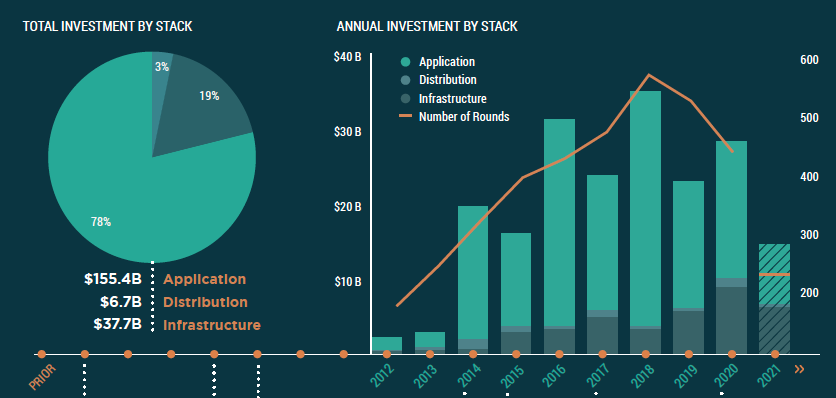
What does all this funding talk have to do with commercialisation? Because commercialisation will have a deep impact on the (European) funding landscape. Change is coming: there will be more access to it. Early signs were seen last year, when 60 percent (as stated in the annual meetings of the ESA Space Solutions network in Berlin in 2021) of investments in European space startups actually comes from European investors.
Commercialisation as a priority
Josef Aschbacher, the new Director General of the European Space Agency (as of March 2021), envisions ESA as one of the drivers of that change. It’s a welcome and necessary change, the report by EIB shows. Not to mention that the US in nearly every circle diagram of investments in space businesses still is dominant.
Aschbacher in his article says the commercialisation of space is 1 of the top 5 priorities for ESA’s 2025 agenda. It’s even one that can “make or break” that agenda, he states, marking its importance. Next, he addresses and acknowledges the gap in European funding to help space businesses to scale-up. “In order to support the growth of the space economy in Europe we need to ensure easy access to capital from investors.”
The role of ESA in this will be clear: “ESA must help European companies to demonstrate strong business cases and to identify revenues that can inspire confidence to invest for the long term, sometimes with ESA as a customer, but certainly not as the only one. And those business cases must be underpinned by strong and validated technical credibility, leveraging our reputation as a technical partner and guarantor.”

As a starting space entrepreneur, it’s simply nice to know that commercialisation of the industry is top of mind at the European Space Agency. To put the money where the mouth is: Aschbacher announced a new department within ESA – the Commercialisation Department. This department will be responsible, among others, for identifying and incubating space startups and businesses with a commercial and competitive potential.
The time is now
Speaking of potential: the space industry is ready for commercial endeavours. There’s more transparency, and the access to knowledge and funding is growing fast. The time is now to seize opportunity and start a space related business.
You can build a space business in one of the ESA BIC programmes throughout Europe. Join our industry and apply now!
